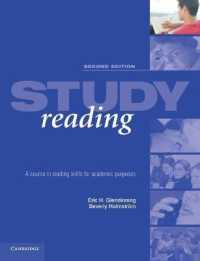基本説明
This book argues that a multilingual approach to higher education is imperative in an increasinly globalised education environment. Higher education cannot afford a narrow focus on English language proficiency; this book addresses the need to acknowldge other languages explicitly in classroom instruction and student learning to imporve student success, to widen access and to internationalise institutions.
Full Description
The general perception that a good command of English is enough to gain access and to be successful in higher education hides the complexity of learning and teaching in multilingual environments, and this book shows that all higher education environments are multilingual to some extent. Strategies like translation, interpreting and switching from one language to another not only support learning but also build competence for multilingual professional environments. Whether institutions focus on widening access to minoritised communities or whether they want to attract more international students, the book argues that a multilingual pedagogy is needed to improve student access and success. Building on work by Nancy Hornberger, Colin Baker and Ofelia García, the book extends strategies and techniques from bilingual education at school level to multilingual higher education.
Contents
Preface
Chapter 1: Theoretical Orientation: The Special Place of Higher Education
Chapter 2: Linguistic Diversity in Higher Education: Official and Unofficial Multilingual Settings
Chapter 3: Managing the Consequences of Widened Access and Transnational Mobility: The Development of Multiliteracies
Chapter 4: Multilingual Pedagogy in HE Classrooms: Approaches and Techniques
Chapter 5: From Mono to Multi: New Thinking about Higher Education








